#japanese dialects
Text
Pitch, Please Pt. 1 [new series alert]
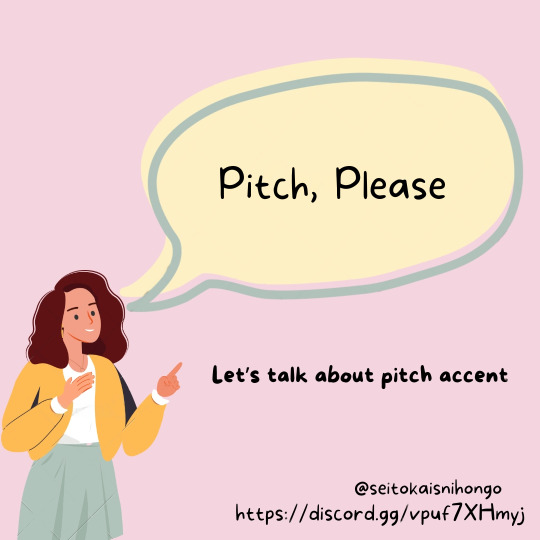
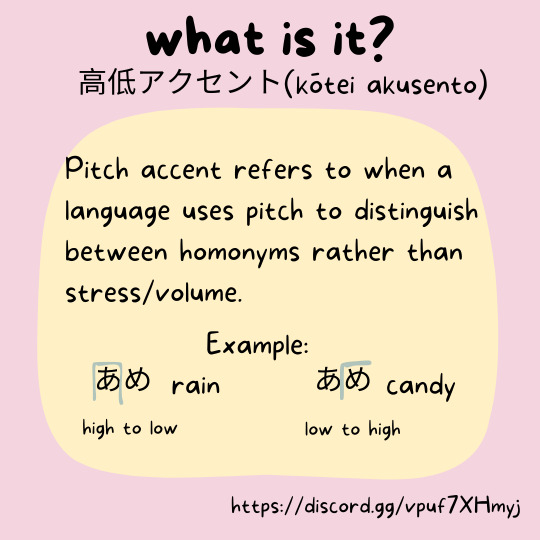
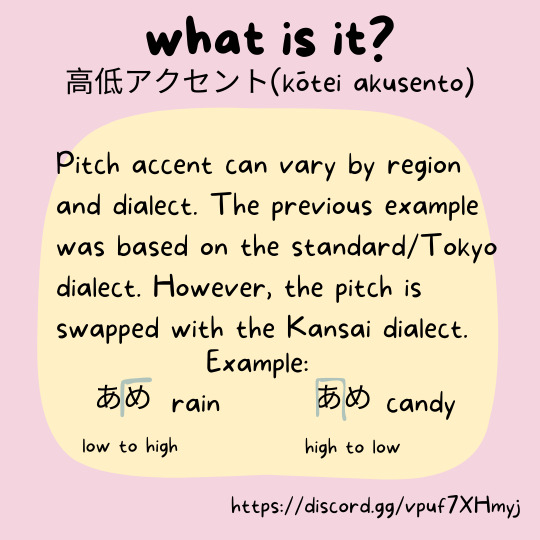
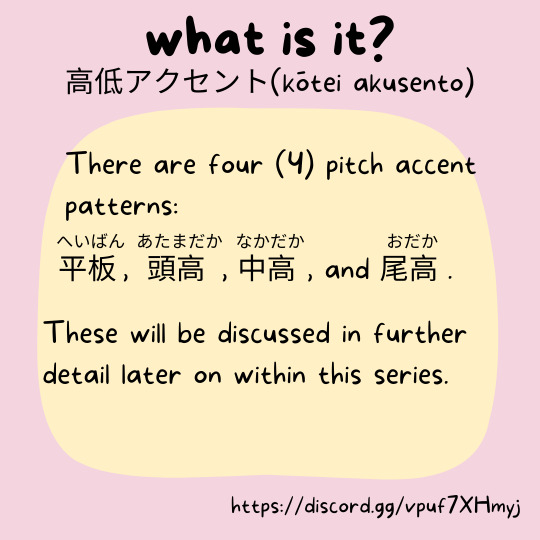

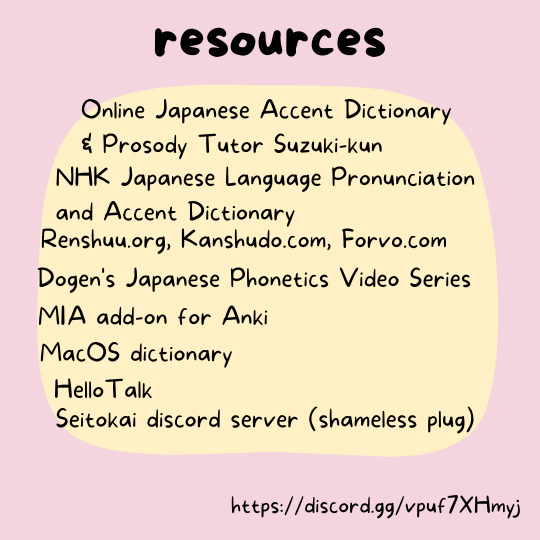

This was launched on the Seitokai IG (seitokaisnihongo). Keep reading this post to get information that is written on the graphics (and the IG caption).
This is a new series that I've been working on for a bit! It'll be discussing pitch accent, dialects, listening comprehension, and anything else that may fall within that category.
If there's a particular dialect that you'd like for us to cover in this series, feel free to stick it in the reblogs, my inbox, my asks, on the Seitokai instagram, or the Seitokai discord server!
Without further ado, here is what the posts say above!
Pitch, Please! Let's talk about pitch accent.
What is it?
Pitch accent, known as 高低アクセント(kōtei akusento) in Japanese, refers to when a language uses pitch to distinguish between homonyms rather than stress/volume. For example: あめ, meaning rain (high pitch to low) vs あめ, meaning candy (low pitch to high pitch).
Pitch accent can vary by region and dialect. The previous example was based on standard/Tokyo dialect. However, the pitch accent is swapped with the Kansai dialect. あめ, meaning rain goes from low pitch to high and あめ, meaning candy goes from high pitch to low.
There are four (4) pitch accent patterns: 平板 (へいばん), 頭高 (あたまだか), 中高 (なかだか), and 尾高 (おだか). These will be discussed in further detail in a later post within this series.
How to work on it?
Listen to native speakers (podcasts, news channels, videos, etc.)
Converse with native speakers (if possible)
Mimic the correct pronunciation
Be willing to ask for help and accept correction
Resources
Online Japanese Accent Dictionary & Prosody Tutor Suzuki-kun
NHK Japanese Language Pronunciation and Accent Dictionary
Renshuu.org, Kanshudo.com, Forvo.com
Dogen's Japanese Phonetics Video Series
MIA add-on for Anki
MacOS dictionary
HelloTalk
If you're looking for fellow learners, there are over 500 of us in the Seitokai discord server (shameless plug) and we'd love to have you!
#japanese#learn japanese#study japanese#pitch accent#japanese dialects#japanese grammar#kanji#vocab#jlpt#reading practice#listening comprehension#reading comprehension#shay's back with another post#pitch please#linguistics#seitokai#grammar
234 notes
·
View notes
Text
Way too far into my first watch of Haikyuu to liveblog shit, but god, Atsumu had his first substantial lines in one of the episodes we watched last night and I feel like I personally should have been warned in advance about his cute li’l Kansai accent??
#haikyuu!!#Japanese dialects#Japanese language#miya atsumu#I’m a weak weak bitch for a Kansai accent lol#I lived in Kobe for a couple of years and Hanshin-area accents in particular feel very Warm to me#in ways I can’t quite explain emotionally#it’s the contrast between a brasher tone and softer-shaped sounds#kansai-ben
6 notes
·
View notes
Video
youtube
Learning more about the local dialect around where I live.
#japanese#japanese langblr#japanese dialects#tohoku#tohoku ben#i've never heard 'ora' around here actually#most of the kids use ore or atashi which is pretty standard
1 note
·
View note
Text
Inarizaki's Kansai Dialect
Japanese Dialects are split into Eastern and Western, with the Standard Japanese dialect being Eastern (Kanto region) and Kansai region dialect being Western (eg. cities of Osaka and Kyoto, and of course Hyogo prefecture- where Inarizaki is from). The pitch, tone, and stressing of the sounds is different from standard Tokyo Japanese so you should be able to hear the difference in how the Inarizaki members speak even if you don't know any Japanese.
just in case yall didn't know, Suna is the only member on the team that does not use Kansai dialect as he was scouted from Aichi prefecture, so he basically just speaks in the standard dialect
Some linguistics of the dialect that may or may not be heard in the show:
"ya" ending vs the standard "da" ending.
Kore kirai ya. vs Kore kirai da. (I hate this.)
the use of the "h" sound instead of "s"
Han vs standard san (honorific suffix, not really used anymore)
Negation suffix "-hen" instead of the standard "-nai".
Taichou kanri dekitehen koto, homen na. vs Taichou kanri dekitenai koto, homen na. (Don't compliment him when he's obviously not taking care of himself.)
verb "oru" vs the standard "iru".
Dareka ga mitoru yo, Shin-chan. vs Dareka ga miteiru yo, Shin-chan.
(Someone's always watching, Shin-chan.)
verb "temau" vs standard "teshimau"
Naitemau yaro! vs Naiteshimau darou! (You're gonna make me cry!)
Negation "suru" verb becomes "sen" instead of "shinai".
Ki ni sen dee. vs Ki ni shinai yo. (Don't worry about it.)
Some words that are different in Kansai dialect:
Honto becomes Honma (really)
Sodane becomes Seyade (thats right)
Nande becomes Nandeyanen (why)
Totemo becomes Meccha (very)
ii becomes ee (good)
"aho" means stupid in Japanese, but apparently in the Kansai dialect calling someone an "aho" is actually a compliment?! (even though it has the same definition)
Overall, I could watch the Karasuno vs Inarizaki episodes a hundred times just to listen to Inarizaki's dialect and how different it sounds to the rest of the characters in the entire show.
Although Karasuno speaks in the standard dialect (which isn't very strange since Miyagi is a suburb close enough to the Kanto region), theres a few lines here and there where one of them says something using the Tohoku dialect (the dialect that would be used often in the rest of Tohoku, such as Aomori).
But that can be a separate post for another day!
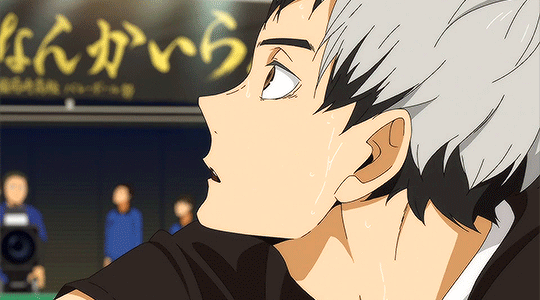
(I especially like Kita's voice, thank you Nojima Kenji.)
#haikyuu#inarizaki#japanese linguistics#japaneselanguage#japanese#kansai#kita shinsuke#miya atsumu#miya osamu#miya twins#suna rintarou#aran ojiro#ojiro aran#akagi michinari#anime#anime and manga#linguistics#dialect#kenji nojima#japanese language#karasuno#tokyo
221 notes
·
View notes
Text
pronouncing the necron 'sz': personal rating list*
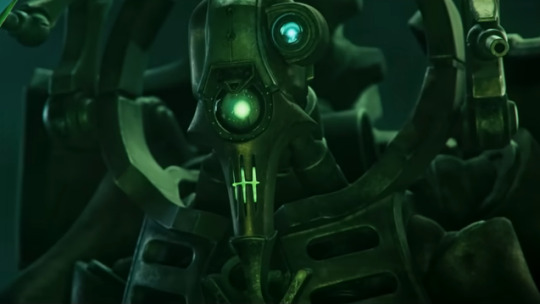
broke: /s/ only ('seras')
woke: /z/ only ('zeras')
provoke: /s/ and /z/ pronounced separately ('s-ze-ras')
bespoke: /ʂ/ or /ʃ/ ('scheras')
invoke: tensed fricative /s͈/ ('sseras')
misspoke: /s/ but evil ('ßeras')
(* Further notes in tags.)
#warhammer 40k#wh40k#necrons#illuminor szeras#necron#shitpost#german speakers i am so sorry you had to read that with your eyes 😂 i also speak german i do know eszetts can't start words#originally this was just for fun but it seems there are quite a lot of ways wh40k fans pronounce this#native english speaking fans usually seem to stick to 's'#whereas in languages that actually use this digraph it would be s/ʂ/ʃ#but in korean translations 'sz' defaults to 'z' so it's definitely 'zeras (제라스)' and 'zarekh (자렉)'#and sometimes the 's' and 'z' are both present and pronounced like in japanese ('s-za-rekh';スザーレク)#(i personally use ʃ because it seems the logical compromise)#in lore terms i think all or most of those pronunciations were used among the necrontyr and there is not one 'canon' version#variety is the spice of life it's fine they're all good. well maybe not the last one but still 😂#according to TDK the necrontyr didn't have a united language until szarekh came along so they must've had different dialects#i reckon that's why the silent king made his universal language. so people could pronounce his name how HE specifically wanted it#it's all becoming so clear now!!!! 😬
86 notes
·
View notes
Text
China's Ningbo accent

English added by me :)
#douyin#video#tiktok#the reason is apparently the ningbo accent inherited wu dialect pronunciations from middle chinese thatre similar to japanese pronunciation
447 notes
·
View notes
Text
18 notes
·
View notes
Text
Wait okay. I’ve been going thru a walkthrough of the teal mask for analysis making purposes and I just realized, Kieran speaks like, way more formally in Indigo Disk. Like he had an implied country-ish accent in Teal Mask but by the time we see him again it seems to be gone…
#polly speaks#Pokémon#indigo disk spoilers#scarlet and Violet#Kieran posting#Pokemon Kieran#bby boy what HAPPENED to you… man.#I’m rly interested if anyone knows if something like this happens in the Japanese dialogue as well#bc I know dialect changes like that are often more apparent in Japanese
32 notes
·
View notes
Note
Sol I gotta ask, when you read japanese, are you at the level where you can read it casually, or does understanding it still take effort? Because even though I've got the basic gist of my second language down, I still would struggle with picking up a novel and consuming it, actively translating the text in my brain takes so much extra effort than skimming words in english 🥲
If it's baby level I can read it just fine haha but longer stuff is impossible without Yomitan because there are just so... many..... kanji......... Picking up a physical novel or newspaper and being able to understand 100% of it is still beyond my skill level, but I am probably at least to a point where I could give like a vague summary of what's happening.
I'm not sure how many kanji I have memorized exactly... When I started the Begin translation a few years back I probably knew maybe 200 (what was I doing translating books at just 200 kanji?!?) and I'd be surprised if I knew less than 800 now, which is nearly a third of the recommended number needed to fully understand a newspaper (~2200). That's just kanji though, my actual vocabulary is a lot higher than that lol
I'd love to take an actual Japanese class some day... Self study has gotten me REALLY far but, like you, there are a lot of times where I have to translate it into English before it clicks with my brain, and I think I would be a lot more efficient at translating in general too if I had more professional studying. Maybe some day!!
#asks#I'd like to take the class in person because ADHD brain needs a 'focus space' to go into study mode#But I live in like the middle of a super western European no man's land as far as Asian languages go haha#Too bad I'm not working with Thai or any of the Chinese dialects...#There are a bunch of Thai and Chinese immigrants here and probably classes/tutors for those languages too#Still endlessly funny to me that I only went with Japanese because my best art supplies only had Japanese language packaging#Now here I am like nearing 3 books translated....
9 notes
·
View notes
Text
sure. headcanoning korekiyo as from kansai because it's also called "kinki" and sounds like the english "kinky" because bondage
but consider
headcanoning korekiyo as from kansai as a play on his overly formal and polite speech patterns, especially given the kansai dialect is typically stereotyped as being more loud/rough/brash/aggressive
#as far as i know this doesnt actually have any basis in canon#i just think it would be kind of interesting and it doesnt have any real impact on anything so its fairly harmless#danganronpa#drv3 killing harmony#korekiyo shinguji#drv3#danganronpa drv3#korekiyo shinguuji#danganronpa headcanon#headcanons and theories#people more familiar with japanese dialects feel free to go off in the replies or reblogs#tell me whether this holds any water or if im up shit creek i guess#dialogue box beeps | speaking
10 notes
·
View notes
Text
10 BL Scenes I Wish We Had Translator Notes On
Inspired by a discussion in this post. Here are some BL scenes I really wish we had extensive notes from translators to read. Or that a language coach or linguistics professor would analyze.
(Note: I don’t always have a picture of the scene in question.)
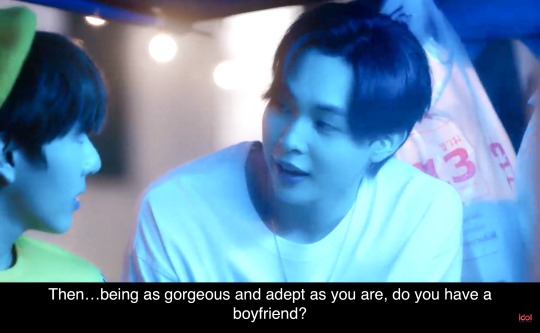
1. Daisy & Touch’s Date in Secret Crush On You
I did this one myself but I am nothing but a dilettante, I’d love someone more experienced with Thai nuance and the queer community do a full on analysis of the language use.

2. Phun coming out to his dad in Love Sick 2
I haven’t rewatched in a while and I would probubly understand more now, but at the time this scene was SO confusing. The translated pronouns are all over the place and I wasn’t at all sure whether he even was actually coming out or not.

3. Thun talking to his mom on the phone in He’s Coming to Me
There a whole subtle thing that goes on when Mes overhears Thun on the phone, to do with “ter.” I think I got it, but also, I think I missed a bit of the nuances that’s insightful to their mother/son relationship.

4. The ex-girlfriend, the boys, and the balcony in Precise Shot
A VERY odd choice as this is a Chinese censored bromance but I am pretty darn sure there is a whole subtextual dig at Taiwan and Taiwanese spoken Mandarin in this scene that went WAY over my head. I think it’s so rich for China to take a dig at Taiwan in an CENSORED BL. I want to know more about what’s going on.

5. The gendered(?) register code switch in the office kitchen in Old Fashion Cupcake
Honestly the translations are just really really bad for this one (on Viki for Japanese in general) and I am super grateful I have at least some ear for Japanese because I can tell when they mess up (which they keep doing). It’s a marker of how good this show is that I adored it despite this. Still, I would like the nuance of this scene explained a bit more. I get that he switched into a feminine register but how exactly? To what degree? What are the additional implications of this? How rare is that for a man of his age? How mocking was it? Or does mockery not come into it? Is there a queer of gay coded implication to this behavior? I HAVE QUESTIONS.
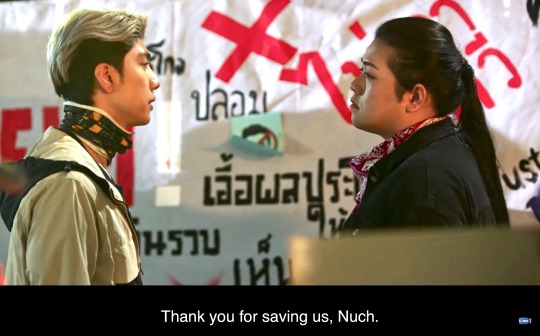
6. Nuch’s speech in Not Me
We don’t get speeches in BL very often, especially not subversive ones from a queer person addressing a crowd. The language is by necessity completely different under these circumstances and I really really like to know how and why certain choices were made.
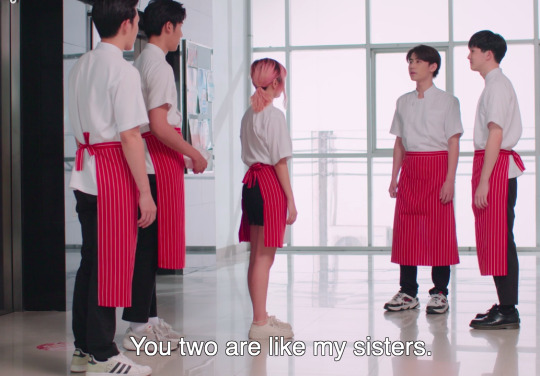
7. Paitong’s speech of protection in La Cuisine
I love the way this one is translated but I am not entirely sure that translation was accurate. The supportive way Pai talks about his sisters (including Kitty in that) made me so happy, I want to believe it is honestly translated but I am not 100% certain that the queer implications of that translation were thought through (in English).

8. The frozen register usage from Prince’s mom in Sky in Your Heart.
I did not like this BL but the language use going on when Sky visits Prince’s house mansion is CRAZY cool. There is a dialectic switch but also a register switch and I am pretty sure they are speaking in frozen (which no one really does IRL unless they are/are with royalty). I’ve never heard anyone speak Thai the way she does.
* Note: Anytime you see Thai script subbed it means the characters are probubly speaking in a heavy dialect. So there are a few shows set in the north, like Siew Sum Noi that I would have liked a lot more linguistic info on, but the fact that I managed to find them translated at all, is kinda a miracle.

9. Yaja time in Semantic Error
I think I fully understand the concept and I got the implications of the drunk conversation before the kiss. But I’d like to know, in that particular version of yaja time, if there’s anything else more subtly queer going in with these two. I mean we all known and could hear that JaeYoung executes the sluttiest “hyung” on the goddamn planet but is there something else happening linguistically?
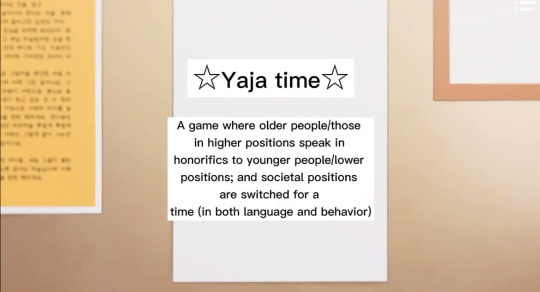
Often with KBL the culture around queer is so coded and so subtle I feel like I am missing a lot of the linguistic hints. Or maybe it just really is that repressed.

10. Mr Cinderella and the pronoun negotiations
I can’t pick a specific scene off the top of my head, although I am sure there is one. I understand from @squeakygeeky that Vietnamese I/you pronouns are pretty gender and power dynamic coded. This makes Mr Cinderella (the least Seme/uke of all VBLs) one of the most challenging on the actors and translations. I’d love it if they, and me, were given more information about this. Not just translation, but script choice, why those pronouns at that point in the narrative? Why the switch? Why NO switching? That kinda thing.
(source)
#thai language#bl language#translation#japanese language#vietnamese language#Mr Cinderella#vietnamese bl#VBL#asian pronouns#linguistics#translating BL#BL captions#korean bl#korean language#Yaja time#semantic error#KBL#Siew Sum Noi#thai dialect#GMMTV#Sky in Your Heart#frozen register#thai registers#thai pronouns#queer linguistics#queer coded language#La Cuisine the series#Not Me the series#Old Fashion Cupcake#japanese registers
189 notes
·
View notes
Text
i think ryuu’s from kyushu (kumamoto) and i think he speaks kumamoto-ben/ hakata-ben (picked it up from traveling to fukuoka a lot when he was young and having friends from there, its comfortable for him) when he gets to uni though he generalizes his speech to tokyo japanese because hes scared of standing out. one time though he gets caught up in the excitement of something and lets a yoka!! slip and kazuma is like. huh? and for the rest of their schooldays will not leave him alone about it. he thinks its so charming to hear ryuu speak in the dialect and asks him to teach him. ryuu is Very embarrassed but also loves how kazuma looks at him as if hes special for it (not to mention... its nice to have a handle on something that kazuma Doesnt know how to do. kazumas such a tokyoite big city important samurai lineage guy and hearing him try to wrap his speech around kumamoto-ben is so cute to ryuu). so it becomes a little secret between them. i can imagine ryuu in the middle of teaching him one day says that if he really wants to learn it he should stay in the area for a bit at least and thats how kazuma slyly invites himself over to meet ryuu’s family one summer vacation :)
#asoryuu#more dgs linguistics headcanon stuff since a weirdly not small amount of people liked my random brainrot yesterday#i feel v strongly that ryuu is a country boy so please accept these Thoughts#anyway. maybe ill write this eventually#my only hangup is that itd be hard to talk about dialects without writing in japanese of course#but if i kept it vague enough. could work#i love you japanese socioling <33
48 notes
·
View notes
Text
short jing yuan angst thingie ??
- includes spoilers for tokyo vampire hotel so be aware !!
- also mentions of unaliving one's self and well death
- gn reader ( 2nd pov used )

i'm thinking of k and noah with jing yuan n his s/o
specifically the scene that goes
"you never wanted to accept my feelings! not even when we were in romania" - noah
"noah, i love you too. i will always love you" - k
"youre lying!" - noah
"i love you, but i can't take you with me into battles. stay here" - k
"i want to be here with you. i love you" - noah
and originally i thought of gepard but when writing this out and looking back at the scenes, i feel jing yuan fits sm better
and i'm also now thinking of the scene where k said like "lets die together" but ends up not dying in the end and not actually being able to die with you </3
or perhaps like you've been granted immortality and have been chasing after jing yuan, just to remember you guys are on opposite teams and you can't be together (i think jingren is getting to my head)
also, another idea is that he had to leave you for his job as the general and blade comes in being all like "he doesn't love you, he betrayed you" and ruined your entire trust in jing yuan. despite all of that, you cannot bring yourself to hate him. you love him, you always had
and you finally get to meet him again, but with the influence of blade's words. you tell him to kill you, he tells you that he's gonna die anyways and would rather die with you. well, things happen blah blah blah and he doesn't die, but you got beheaded so kinda silly !!
#mafuyuwrites#jing yuan#jing yuan x reader#jing yuan x you#honkai star rail#hsr#honkai star rail headcanons#star rail#honkai star rail x reader#hsr x reader#jing yuan scenario#also too scared to add this into the post but yk how the loufu is based off china? well china has a lot of dialects#so i am just imagining that you guys are speaking in different dialects like how k and noah were speaking#although it was romanian and japanese i dunno if that is comparable to one another
20 notes
·
View notes
Text

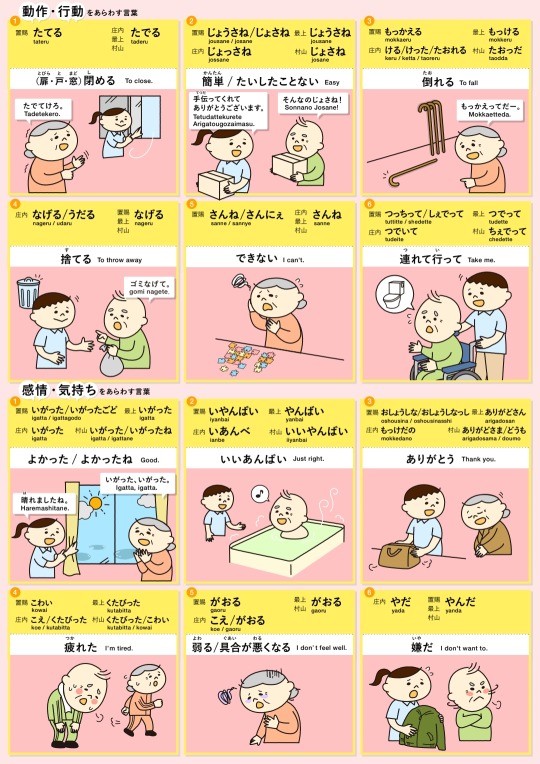
Some Yamagata dialectisms my supervisor sent me.
置賜(おきたま)- south Yamagata, kinda moving into Fukushima
村山(むらやま)- north of Yamagata city, kinda central within the prefecture
庄内(しょうない)- west/north west
最上(もがみ)- north east, towards Miyagi
#japanese#japanese langblr#learning japanese#personally i've never heard any of the kids using these#but i'm assured older people use them#and sometimes if the kids live with their grandparents they'll pick up more dialectisms#maybe as i get more fluent i'll start to hear them more
52 notes
·
View notes
Text
Haikyuu Miyagi Dialect
So I mentioned in my Inarizaki's Dialect post that Karasuno (and the other Miyagi schools) would actually speak in the Tohoku dialect (technically). They don't really speak in the dialect (they speak the standard dialect since they live in a suburb of Sendai, which is big enough and close enough to the Kanto region (tokyo)), but theres a few lines in which some characters do use a little bit of dialect. So here are some examples that I can think of:
disclaimer - im too lazy to properly rewatch the show so im going off memory, therefore i cant guarantee 1000000% accuracy
Sugawara, Terushima, Hinata, Oikawa, Asahi, and Iwaizumi seem to have the most noticeable Tohoku dialects from what I remember hearing??
Suga (and Terushima?) especially ends his sentences with "-yarube", "-dabe", "-be" quite often which is very miyagi of him, he definitely has the strongest dialect out of all of them.
A specific example from Asahi is him saying 俺は昨日残るって言ったべよ! (ore wa kino nokoru tte ittabeyo).
I also remember Iwaizumi saying バレーはコートに6人だべや! (bare wa koto ni roku nin dabe ya).
Hinata says 昼飯食うべ (hirumeshi kuu be) along with other tohoku-like sentences
and I think Daichi once says 一回聞いとくべ (ikkai kii toku be)
I also remember reading somewhere that "boke" (often used by Kageyama and Iwaizumi) is reminiscent of the Tohoku dialect but im honestly not too sure....?
OoOOOooOO i just remembered a specific dialectal word that Oikawa once uses towards Kageyama is おがったね (ogattane). he uses the verb おがる (ogaru) which means "to grow up" in tohoku dialect.
Ukai once uses いずそうな (izusouna) which is also part of miyagi dialect
basically, you can assume that sentences ending with "-be" in haikyuu are miyagi dialect
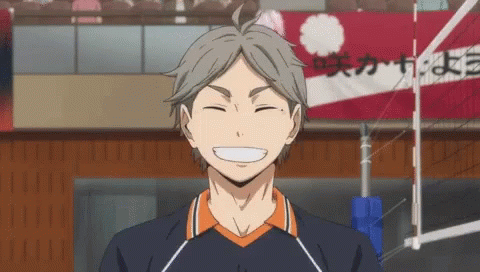
(this is a completely different anime but in jujutsu kaisen Itadori actually uses some tohoku dialect closer to the beginning of the story which I thought was also interesting)
#japanese linguistics#japaneselanguage#linguistics#anime#anime and manga#haikyuu#sugawara koushi#asahi azumane#sawamura daichi#hinata shoyo#kageyama tobio#iwaizumi hajime#oikawa tooru#ukai keishin#terushima yuuji#karasuno#aoba johsai#dateko#date tech#shiratorizawa#johzenji#dialect#language learning#jjk#jujutsu kaisen#yuji itadori
62 notes
·
View notes
Text
Japanese thoughts and philosophies are small. (Essay)

Kitaro Nishida
Kitaro Nishida is probably the most famous Japanese philosopher. Using his experience with Zen as the core, he sought to fuse Buddhist doctrine with Western philosophy. He tried to absorb Western philosophy by using the special religious experience of Zen.
He said, if it can't explain this kind of religious experience, it's not philosophy. However, shouldn't religion and philosophy be clearly distinguished? I don't think it's good to confuse the two.
However, a common theme between Buddhist doctrine and Western philosophy is the ``Law of Excluded Middle.'' The basic attitude of Western philosophy is that it is impossible to be "A and not A," but Buddhist doctrine holds that it is possible to be "A and not A." Therefore, Kitaro Nishida and his friend Daisetsu Suzuki follow the Buddhist theory that ``A is not A, and therefore it is exactly A.'' I think this is sophistry.
Rather, isn't the thesis that in Western philosophy's ``dialectics'' at the end of the contradiction between A and not A, ``B, which is neither A nor not A, is born'' more straightforward? The law of excluded middle can also be overcome from within Western philosophy.
Kitaro Nishida's philosophy attempted to fuse Buddhist doctrine and Western philosophy, but it ended up being a miserly failure, and I believe that he ended up simply compromising the two. Japanese thoughts and philosophies have their limits, and it is impossible to create great ideas that will be accepted worldwide.
Rei Morishita
日本の思想と哲学は、小振りである。(エッセイ)
日本人の哲学者として、たぶん最も有名なのは西田幾多郎だろう。彼は禅を体験した経験を核として、仏教の教理と西洋哲学を融合させようとした。禅という特殊な宗教体験を以って、西洋哲学を併呑しようとしたのだ。
この種の宗教体験を説明できなければ、哲学ではないという勢いだ。しかし、宗教と哲学は峻別すべきではないだろうか。両者の混同は宜しくないと、私は思う。
ただ、仏教の教理と西洋哲学に共通する切実なテーマは「排中律」であろう。「Aであって、非Aである」ことはありえないというのが西洋哲学の基本的態度であるが、仏教の教理では「Aであって、非Aである」ことがあり得る、とされる。そこで西田幾多郎と友人の鈴木大拙は「Aは非Aであり、それによってまさにAである」という仏典の説に則る。私は、これは詭弁だと思う。
むしろ西洋哲学における「弁証法」で、A、非Aの矛盾の果てに「Aでも非Aでもない別のBが生まれる」というテーゼのほうがずいぶん素直ではないか。排中律は、西洋哲学の内部からでも克服できる。
西田幾多郎の哲学は、仏教の教理と西洋哲学を融合させようとしたが、それは無残な失敗に帰し、単に両者を折衷しただけに終わっていると考える。日本の思想や哲学には限界があり、世界に通用する大思想は生み出せないのだ。
#Japanese thoughts and philosophies#rei morishita#essay#Kitaro Nishida#Zen#Buddhist doctrine#Western philosophy#Law of Excluded Middle#sophistry#dialectics
11 notes
·
View notes